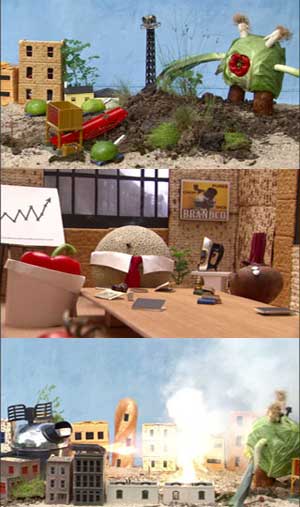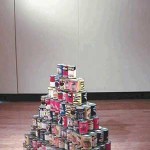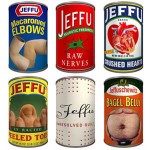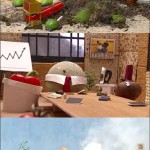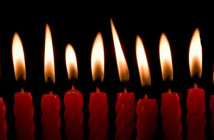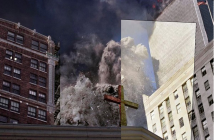Boston artist Jeff "Jeffu" Warmouth is a funny guy. His work incorporates elements of children's tv (think "You Can't Do That On Television") with prop comedy, Jewish humor, kung fu and cooking. His pieces have popped up at Art Interactive for Participatory Democracy; and coming soon he will be co-curating a game show at Art Interactive with ICA Prize-winner Roland Smart.
After long conversations over dinner after several First Fridays, it became clear that it was time for Big RED & Shiny to talk shop with the man wearing the handlebar mustache.
This interview took a while to complete, via email rather than my preferred face-to-face method, but it was worth it for one reason. Near the end of completing this text, Jeffu sent me a rough cut of his new piece: "The Day of the Cabbage". I was barely in the door before I had torn the package open and was jamming the DVD into the player. My girlfriend, an avid TV viewer, sat with a bored look on her face, waiting patiently for this 'art crap' to finish.
Within minutes we were both on the floor laughing hysterically. Jeffu's skill as a master craftsman of intelligent humor was reconfirmed, and I dug in with extra vigor to finish this piece.
MN: Your work combines humor with everyday items and experiences to subvert what we expect from language, culture and identity. Can you talk about how your unique brand of prop-comedy / concept-art came into being?
JW: I began to seriously fuse humor into my work in the summer of 1995, before my second year in graduate school. Up to that point, my work (primarily photography) was more seriously and self-consciously "art." A series of hard-hitting critiques forced me to question my artistic motivations, so I did a lot of soul-searching that summer, watching Woody Allen & Marx Brothers films and trying out new recipes -- literally cooking -- in the tiny kitchen in my studio apartment. As far as art was concerned, I didn't make anything for probably two months. I was just immersing myself in comedy, cooking, and the mundane.
It finally dawned on me that this was "the stuff." When I finally brought out my camera, I used everyday kitchen items to create photos of visual/verbal puns staged in my kitchen ("Transplant", "Eat Your Words", "Ashes to Dust"). Some of them were sketched out beforehand, others made up on the spot, but they were all as fun to make as a new recipe. There was really no turning back. As one of my professors was fond of saying, "You're lucky if you have three good ideas in your life." Most of my work has followed from this "eureka" moment, refining it, investigating the concepts.
This set the tone for a lot of later work, the other photo & video work throughout grad school, the absurd sculptures made from mundane objects (infinite lemon battery, cabbage pulley [failed]), the genre films (Kung-fu Kitchen, Il Spaghetti Occidentali, Day of the Cabbage, which is in progress), Strictly Kosher Style, SuperJEFFUMarket. Of course the concepts have all expanded and refined over time, along with the technologies and craftsmanship, but I guess I managed to milk this one for a while!
MN: There seem to be a lot of interestingly diverse influences that converge in your work: photography, performance, children's television, Jewish humor... It's a long list. After your initial 'eureka!' moment, what continues to feed your brain as you look for new forms of humor in plain sight?
JW: Good question -- how do we feed our brains over time? I constantly delve into new things and try to apply the comic lens. My humor stems from a worldview: I see culture, identity, institutions of philosophy, art, science (you know, the little stuff) as absurd human creations to be subverted. Then again, on some days I just want to come up with stupid puns and make myself laugh.
Most of these influences come fairly naturally, since they are things that interest me. For instance, I found myself watching lots of Chinese martial arts films. I had been using vegetables and household items as source material in my photos and videos, and one day I wondered what it would be like to create a parody using vegetables as actual characters rather than as inanimate source material. Of course this idea became Kung-fu Kitchen.
After the initial spark, I typically do fairly exhaustive research. For SuperJEFFUMarket, the initial "aha" moment was to create a fragmented "self-portrait" out of canned goods, which then grew into the idea of an entire self-portrait supermarket. Then began endless trips to grocery stores, and poring through books and websites to find the most interesting, recognizable, bizarre, or otherwise suitable product labels as raw source material. Then the much more mind-consuming stage of journaling and sketching to create new and/or transformed can labels. It was very important that each label is comic -- each can is a self-contained set of visual and verbal jokes that also fits with the context of the entire project. Most of the comic and absurd transformation is locked down in this development stage. After "pre-production," the rest of the process is fairly practical: digitally creating new labels, finding a print shop that could match the look of commercially printed labels, finding a source for 2000 empty cans, etc.
MN: There is a lot of Jewish humor in your work. There is also a lot of Japanese pop culture in there. How is it that these have found their way into your kitchen humor?
JW: Jewish humor has always been concerned with subverting logic, language, identity, and generally turning things on their head. Many great American humorists come out of this tradition: the Marx Brothers, Woody Allen, MAD Magazine, Firesign Theatre, The Daily Show. I respond to the anarchic and subversive tendencies, the relentless questioning and overturning of cultural boundaries, the absurd worldview, and the constant language and identity play. Above all, this stuff is really funny! Most of the profoundly funny material that really makes me laugh and think at the same time comes out of this tradition.
I began thinking about Jewish humor when I realized I was creating comic artwork with the same goals. I took a course with Louis Kaplan, who later curated me into his exhibition "Distinguishing/Distinguished Jewish." I was the only goy in the show, which plays with the notion of Jewish humor as a means of dealing with dominant ideology. I created Strictly Kosher Style, in which I did tons of research on the kosher laws and the tradition of Jewish jokes about them before creating the absurd recipes. I know more about keeping kosher than most Jews I know.
As far as Japanese pop culture goes, I lived in Japan and have also travelled throughout East & Southeast Asia. I've studied the history, art, and language (although my Japanese is rusty by now). I guess being an outsider in another culture hones my ability to see absurdity or humor in my own. It gives me a sort of critical distance to comment on my own life, identity, and culture.
MN: Given that your work is not very ‘commercial’ in the gallery sense, where have you been showing your work? What would you say is the ‘experience’ of a Jeffu show? What would be the ideal Jeffu exhibition?
JW: When I show, it is generally at alternative spaces & community based galleries & museums: Art Interactive, the Mills Gallery,DeCordova, and other similar spaces. There is definitely a freedom in that kind of space. On the other hand, I've honestly never approached a commercial gallery -- the fit doesn't quite seem right, as you note, but I can't really critique the commercial gallery system from the inside, not having been there. I don't mind selling work, though I strive to keep things affordable --the work I've sold the most are the SuperJEFFUMarket cans. Ironic since that piece is the most subversive & critical of consumer culture. But it's also the most fun & engaging to shop for -- people are already culturally hard-wired to react to canned goods. They know they should be comparison shopping!
I suppose that would be the "experience" of a Jeffu show. Subversive yet fun. I'm always concerned about the direct experience of the viewer, and not losing that audience connection. I do that through humor, and by drawing on avenues that people already relate to: shopping, music, voting, etc [what's next???]. I always want people to be directly engaged, laughing, and thinking.
The ideal Jeffu exhibition? I'm not so sure, which may explain why I haven't had a solo show in, well, a long time. I don't know -- a complete interactive funway, with rides, food & games? And Jeffu clones as hired carnies?
MN: Your website showcases your work in a format that seems made for what you do. How do you see the web as an outlet for artists making non-traditional sculpture, video and photography such as yours? Do the ideas of ‘new identities’ on the web suit the creation and expansion of the Jeffu persona?
JW: I have mixed feelings about it. As for the sculpture & installation work, I only see the website as an archive or a substitute for seeing the actual work. But I suppose I've been working so long in photo-based media that I even document the sculpture in a transparent way, so that viewers can focus on the work instead of the way it is presented.
But you know, it just occurred to me -- the SuperJEFFUMarket can images that appear on the site are not actual photographs of cans, they are the mockups I made with a 3D rendering program as I was creating the labels. So they are completely digital images -- perfect for presentation on the web!
I think the web is a great medium for showcasing non-traditional work, for making people aware of it. Comparable to a book, with better & easier distribution, but lower resolution. Still a substitute for seeing the work in person -- particularly sculpture & installation work (though the photo pieces are much more suited for the web). The tools for getting viewers engaged online are different than engaging them in person. I've thought about how to apply this stuff a lot in terms of putting together my site, as well as in my "day job" as a teacher of digital interactive media. Funny how it doesn't directly show up in my artwork.
- SuperJEFFUMarket installed at Pitt State
- Six of the many cans from SuperJEFFUMarket
- Above: three videos stills from The Day Of The Cabbage.
Links:
Jeffu.tv
Jeffu's Kung Fu Kitchen at iFilm (RealVideo)
Jeffu's Kung Fu Kitchen at UndergroundFilm.org (Quicktime)
Jeffu's Il Spagetti Occidentali at Jeffu.tv (Quicktime)
All images are courtesy of the artist.

